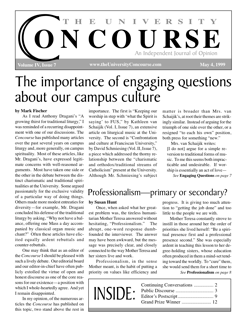Of private and collegiate morality
by Kathleen van Schaijik
I think the dilemma posed by Joanna Bratten in the last issue of the Concourse would go away if she framed it differently. In truth, there is no conflict between a Catholic university’s call to foster the moral well-being of its students and the students’ right to privacy. On the contrary, schools who do least to “interfere with students’ private lives,” do most to ensure that their students have no protection whatsoever against the aggressions of the shameless. Only think of dorm-room date-rape. And I don’t know how many times I’ve heard stories of girls who were forced to flee their rooms night after night because the roommate’s boyfriend was sleeping over, again. Then there are the notorious co-ed bathrooms at some secular colleges. A guy I know once told me a story of his first day on campus. He was standing at a urinal—using the urinal—when a young women came up to him and began a friendly conversation: “So, where are you from?”
These examples go to show how wrong-headed it is to imagine that fewer rules means more privacy on college campus. It would be much easier to make a case for exactly the opposite.
I think the difficulty comes in with assuming that when the college makes rules regarding morality it is necessarily doing so in loco parentis. I agree with Ms. Bratten that university officials should not pose as parents. They have vis-a-vis their students nothing like the rights or duties parents have to oversee the well-being of their children. But it does not follow from this that they have no moral authority at all, nor that any regulations beyond those against property damage must aim at controlling the private lives of their students.
Every university should consider itself obliged to foster an atmosphere that is conducive to intellectual pursuits. That implies insisting on such things as decency, order and spaces of silence. Every Catholic university is further obliged to foster an atmosphere of lively faith, in which the religious life of the mind can best flourish. That implies honoring God, offering the sacraments, encouraging prayer and providing protections against evil influences. The leader of a school like ours does well to say to its students, “Your soul is in your own hands, but this campus is in mine. And as for me and my university, we will serve the Lord.”
Of course, what this means practically, rule by rule, is question of prudence. Personally, I’m against permission slips, but for closed dorms. (I mean single-sex dorms wherein in opposite sex friends may visit only during designated open-hours—like we find at FUS.) But it would be good to hash it our further next year.


